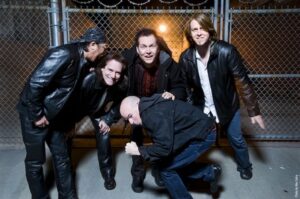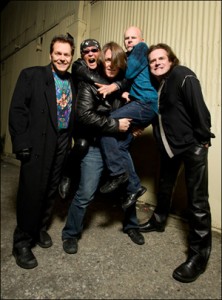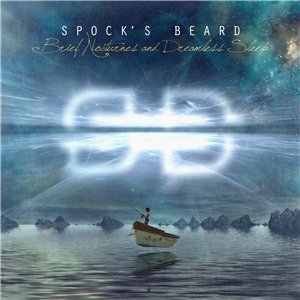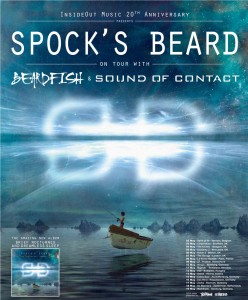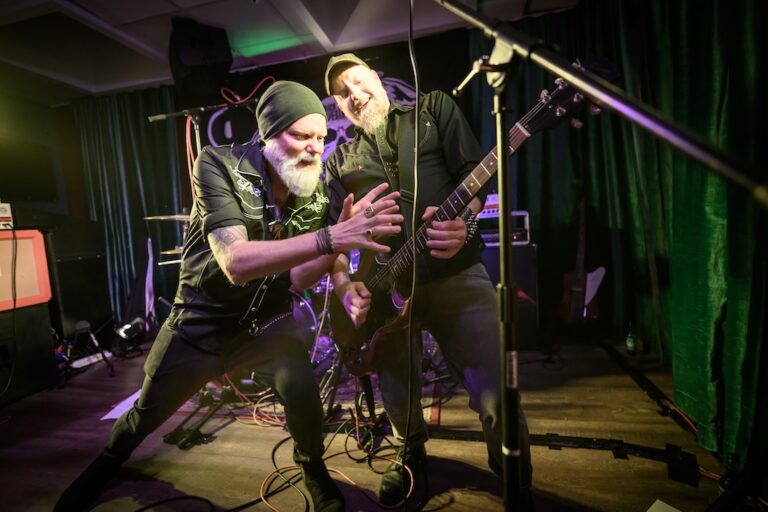With new album ‘Brief Nocturns and Dreamless Sleep’ proving to be one of the most exciting and energetic releases of the band’s career, Spock’s Beard are about to embark upon a lengthy tour throughout May, including five dates here in the UK. With two new members in the band (Ted Leonard and Jimmy Keegan) and the album itself a double disc epic that has benefitted greatly for having been funded in part by the fans themselves who pre-ordered the release before it was even made in order to allow the band to record to the standard that they are used to. Packaged in beautiful artwork and bearing a proudly evocative title (especially after the ambiguously named ‘X’) we were lucky enough to gain an audience with long-time Spock’s bassist Dave Meros, a prospect that was exciting and daunting in equal measure and which was made all the more daunting by a hefty bout of snow that predictably paralysed UK transport to the extent that your humble scribe walked through the door to find the phone ringing, having had no time at all to prepare the recorder and fire up the trusty lap top bearing the all-important questions. As a result we had to humiliatingly ask Dave to phone us back which, like a true gentleman, he did.
Minor humiliations aside, SonicAbuse was truly privileged to have the opportunity to speak to Dave about the line-up shuffles, the development of the excellent ‘Brief Nocturns…’ and the changes to the industry over the years in a wide-ranging interview that is published in its entirety below. So, fire up some Spock’s beard and read on to discover the secret behind the album’s sequencing, the development of the stunning artwork and much more…
You’ve had something of a line-up change with Jimmy Keegan and Ted Leonard coming in – what ideas did they bring to the album and the recording process?
Well, Ted is quite a good songwriter and he brought in two songs that he wrote himself previously and they just happened to work out great on the album and he also wrote lyrics for ‘afterthought’. Jimmy had a lot of really cool drum and really cool background vocal ideas, so they really added quite a bit.
‘Hiding out’, particularly has a very different, very energetic feel to it…
Yeah, that one turned out great. Ted’s demo of that was a lot more kind of sedate sounding, perhaps more like something his other band, enchantment, would do, and he kind of Spockified it and presented it to us, and we wanted to do it and we recorded it and… well we heard this really rough mix with only a few of the instruments on it and everyone just thought “oh no, we’ve ruined it!” because we did play it a lot more energetically than his demo and it sounded, at the time, like a little bit of heavy handedness. But, once we got the rest of the parts on there and we got a real rough mix and a good representation of it, it really took off and it does good have a great deal of energy, even though it’s not a real powerhouse kind of song and it’s got a lot of energy behind it.
Is that the common mode of writing in Spock’s Beard – to have band members bring in demos and then the band work on them together.
Yeah – that’s been the case for the whole time – Neal used to send us complete demos and we’d just learn the parts off the demos and make minor change here and there. And this continued through, we usually write in groups of two or someone by themselves, and we’ll do a demo and then send it around, and if there’s any changes to be made then, we usually get together a few weeks before we record and do a series of rehearsals, and at that time we make any arrangement changes and little things that need doing. Mainly the songs are written in groups of one or two and then sent around.
Speaking of Neal, he actually turns up as song-writer on two of the tracks, and adds some guitar, I think, to one of the tracks…
Yeah –
How was it to write with Neal again?
Him and Alan stay in contact because they’re brothers and on this one in particular Al had a couple of ideas that he had and was working on and he got stuck, so he called Neal and asked him to help out and Neal agreed, so Al flew out to Nashville where Neal lives, and spent a week there and they fleshed out a couple of songs and that was ‘afterthought’ and waiting for me’ and they both turned out great. I think Neal played some guitar on a demo of one of those songs and the demo wound up staying on the record… I’m not sure, but yeah his guitar is on there. The same thing with the last record, I can’t remember which song it was, but Neal had written part of it with Al and it’s not like we’re all in the same room, writing, but he’s definitely there and we welcome that.
The title ‘brief nocturnes and dreamless sleep’ is a beautifully evocative title, is there an overarching concept behind the album?
It’s just a collection of songs, the title was just accidental. It was just something that sounded cool, it doesn’t mean anything at all. It was in a book that Alan was reading, and this phrase just popped out at him, and he thought ‘wow that’s a cool phrase, maybe we can use that for something’. We’ve been getting a lot of static for boring album titles – we had the self-titled one, followed by the tenth album called ‘X’ so people were saying “c’mon guys, you can do better than that!”, so we just wanted something that sounded really nice, and that definitely did so we just used it – it doesn’t really mean anything… in fact, there’s nothing brief or nocturnal about Spock’s beard, so it’s kind of the opposite of what we play but… it does sound nice!
There’s a really nice, almost jazzy feeling to some of the album, for example ‘I know your secret’ – is that a genre that appeals to you as well?
Well, you know, we all grew up in the 60s and 70s and there was a big jazz fusion thing going on then, and we all have those influences, and every once in a while they pop out so… that song does have a kind of fusion deal to it, especially that one part that’s at the beginning, the middle and the end, very… poly-chordal I guess you might say, so yeah that kind of stuff we all really like it and it’s really fun to play so it does emerge every once in a while.
That’s one of your songs I think as well…
Right, yeah that was my sole contribution on this one.
With this album – you’ve been funding this album through the fans and the pledge system – has that changed the way you record and get ready to do an album?
No it hasn’t changed it, what it’s done is allowed us to keep recording the way that we’ve always recorded. The reason we do it is that the days of the adequate recording advance from the record company have long gone and so our advance, from the record label, would basically cover about a third of what we normally spend on recording a record, so obviously that’s not going to pencil out too well on a spread sheet, so we had to get creative and find our own ways to finance the record. We took a page out of the Marillion play book and did a pre-order and that really raised the other 60-70% of the money that we use in recording, otherwise we’d have really have to start cutting corners in the recording process, and to be honest with you I don’t know if Spock’s Beard is capable of that. I mean, we seem to have evolved into a certain set of habits – you know, recording drums in a certain place and taking a certain amount of time to mix songs – and there’s a little bit of inefficiency and self-indulgence involved there, but you know we spend what we spend and this pre-ordering has allowed us to continue doing that.
You mentioned that you spend a lot of time mixing, but one of the things that always intrigues me in progressive rock is how long you spend sequencing the album to get the flow from start to finish?
Yeah – that’s kind of a funny story. We had decided to do a main disc that was very concise and cohesive, and a bonus disc for whatever didn’t fit into that kind of category, and we decided to do that and then the arguments started – which songs were going to go on the main disc and what order they were going to go in and there were like three schools of thought – three camps – and each one was completely different and we just couldn’t agree. So finally I just sent all of our material, complete with the bonus tracks and everything we’d recorded, and I sent it all to Thomas, the president of insideOut and said “Just listen to it and tell us what order you would put it in…” and he listened to it for a few days and came back with an order that was not even close to any of our ideas, and we were just like “what? Really?” but I stuck the list in iTunes and listened to it a few times and realised he was right – it really made sense that way. So Thomas actually picked our song order, we struggled over it for two or three weeks and he picked it in a day or two, and it really worked… so you have to talk to him!!!
So it is a challenging process when it comes to crafting the album?
Yeah – you know when you have multiple writers and everyone has their favourite solo that they played and their favourite bass part/drum part/vocal that they played or whatever, it’s really difficult to be completely objective and you get married to those things that you like and then you get kind of an allergy to the things you don’t like and that effects your judgement every step of the way. One thing about Spock’s beard, we’re usually smart enough to realize what our limitations are and we’ll bring in outside writers or, in this case, we’ll consult Thomas and listen to what he says. We know we’re biased and our heads aren’t clear in that regard.
Spock’s beard always have very cool artwork/T shirt designs and so on – how involved are the band in that visual side of things?
We usually start out with something, it’s kind of funny really, we usually start off by just telling an artist that we don’t really have any ideas and then they’ll come up with something that’s pretty cool (or maybe not) and we’ll say “ah, that’s not quite right, can you try something else?” and eventually we’ll get something that’s really cool, but it just needs minor changes and then we’ll start becoming really engaged in it. instead of the two people looking off into the distance, maybe we’ll suggest putting them in the water, or in a boat and we’ll go back and forth like that quite a few times until it’s done. So yeah we do get involved, about half way through the process, but at the beginning of the process it’s usually just a cry of “help! We need art!”
The artwork always seems to be very important to progressive music – is it something that’s important to you personally as part of creating ‘an album’?
I think it’s more important for some of the other guys than me – I’m not really a visual person but, you know, Al and I were talking before the album started, about remembering when we were kids and every once in a while we’d go to the record store, thumb through the records, and pick something out just because it had a really striking cover – you know “this has to be good – with artwork like this!” So that’s one of the things that we told Thomas Ewerhard, our art guy, we just said that we wanted something very visually striking and he really did a great job, I think it’s probably one of our best CD covers… in really a long time, maybe ever.
Is this one of the things that is being lost with downloading and iTunes and that sort of thing?
Oh yeah – it’s not only that. It’s the technology definitely. You know the economic situation in the word and the social situation. People are different; times are different; everything’s different. I can’t even imagine doing what I did as a kid – buying a record, turning down the lights and just sitting listening to it and doing nothing else… poring over the album credits and really taking the time to absorb it… it seems like music just isn’t enough on its own anymore, to many people. I’m saying that as a general public kind of thing. I think a prog rock audience is still a little bit more tuned into the music. But the download thing really was a game changer – both legal and illegal downloading really changed everything, the whole income structure and everything about the recording industry was changed by technology and the way technology changed people… you know changed society… and the way people looked at media.
Are you still a fan of buying albums and finding new music, given that you’re inside the industry so to speak?
When I find an album that I want I’ll buy it as a physical thing. I have never purchased an album via download. I kind of want the CD booklet, you know and not an e-booklet that I have to read on the computer. I want to go and sit in another chair and be comfortable and be able to read it, in my hand, printed out. So I really like the physical CD, still, but having said that… I don’t know it must be a phase or something, but I haven’t really been listening to that much music lately – head’s in another place I guess. I have kind of come back recently, I bought three or four CDs so maybe I’m coming back…
You’re touring the UK in May I think…Given that the songs of Spock’s Beard are generally quite long, are you going to be focusing on the new album or doing a more holistic set covering your career?
Well, we’re… our main CD is only about sixty-something minutes, so we can do almost the whole CD and still have plenty of time for the old stuff too. The way the set is worked out and the songs we’ve chosen, it’s probably about 60% new and 40% old so it’s going to be a really good mix. We’re doing almost every song off the main disc except for one, and then we’re doing plenty of old ones – you know the big favourites from the past, so it should be a really good show.
Are there any songs that you particularly enjoy playing?
Not really. I’m not saying that to be sarcastic or negative either. Whatever we choose I usually really enjoy playing it, and if it works in the set and it’s getting a good reaction, then that’s total success for me. There are some songs I enjoy playing a little bit more than others, but not really enough to just say that I have to do one and not the other – they’re all enjoyable for me to play. If they’re working – that’s the most important thing – if the set feels like it’s going to work and get the audience going, then I’m totally happy with it.
We are doing a couple of songs that I really like personally as far as listening goes, I think we’re doing ‘go the way you go’ on this tour and ‘walking on the wind’, you know back from the old days. The new ones are going to be fun to play as well so it’s going to be a pretty enjoyable set, hopefully, listening to as well as for us to play.
It seems that the genre of progressive rock is much more accepted over here in Europe than in the US – is that something you’ve experienced?
Yeah – completely. That’s always been something we’ve been trying to change since the very beginning. I think there’s… there are a good number of prog fans over here, but it’s a big country and they’re all spread out, and it’s hard to reach all of them. In Europe it seems a bit easier and I think that people there seek out music a little bit more in the UK and Europe. Touring especially, we can tour in Europe and we’ve tried so many times to tour in the US and we just keep haemorrhaging money and there was a point where we just had to stop doing it because we couldn’t afford to lose money anymore. It’s a weird situation, I think it’s mainly geographical.
It’s interesting that there are so many good US prog groups like you, Queensryche, Dream Theater and the like…
Yeah – there’s a lot of demand… by musicians to play it! There’s a lot of people here who really want to play that kind of music and in the back of their minds they know there’s a market somewhere, if not in their own countries then in the UK or Europe or somewhere. And I might add that there’s a really good progressive scene throughout the world now. I’ve heard some just stunning bands from Ukraine and Sweden, of course, is just on a roll – I mean there are so many great musicians and bands in Sweden right now, I don’t know what’s in the water over there… what they’ve been drinking… And the UK – there are some stunning albums coming out of the UK and the rest of Europe –there’s like a resurgence in prog rock and I think the real talented writers and musicians, before the prog rock revival, went off into different musical forms… jazz and classical or whatever… and now a lot of the virtuoso players are coming back into the rock realm because they know they can express themselves in progressive rock. It’s really increased the competition for us, I can tell you that!
You’ve reached album number eleven and you’ve had a lot of success and gained a loyal following, what ambitions remain for Spock’s Beard as musicians?
Well the biggest ambition is the one we’ve been carrying for really a long time, which is to reach a level which allows the band to become a sustainable lifestyle for us, and be able to drop the cover bands and all the crappy day jobs and whatever else we have to do to make a living, and focus our energies more on the band so that’s still our goal, and it always has been, and we’re still working towards that and hopefully it’ll happen before retirement age!
Any final words for your UK fans?
Oh yeah – the UK guys are great – we’ve played in the UK… I don’t know what the deal is… but we have totally great, energetic shows every time we play in the UK so we’re really looking forward to it.
Is it four or five dates?
We’re doing five on this trip – one in Scotland, one in Newcastle, Sheffield, Bilston and London – it’s going to be great.
-End-
And for those of you wanting to check out the mighty Spock’s beard on tour here are the dates:
| Spock’s Beard live with Beardfish and Sound of Contact. |
| 02 May, 2013 – Spirit of 66 – Verviers, Belgium |
| 03 May, 2013 – Corporation – Sheffield, UK |
| 04 May, 2013 – The Arches – Glasgow, UK |
| 05 May, 2013 – Academy 2 – Newcastle, UK |
| 06 May, 2013 – Robin 2 – Bilston, UK |
| 07 May, 2013 – The Garage – London, UK |
| 08 May, 2013 – La Scene Bastille – Paris, France |
| 09 May, 2013 – Z7 – Pratteln, Switzerland |
| 10 May, 2013 – Hirsch – Nürnberg, Germany |
| 11 May, 2013 – Majestic – Bratislava, Slovakia |
| 12 May, 2013 – A38 – Budapest, Hungary |
| 14 May, 2013 – Szene – Vienna, Austria |
| 15 May, 2013 – Colos-Saal – Aschaffenburg, Germany |
| 16 May, 2013 – Das Rind – Rüsselsheim, Germany |
| 17 May, 2013 – Zeche – Bochum, Germany |
| 18 May, 2013 – De Boerderij – Zoetermeer, Netherlands |
| 19 May, 2013 – Markthalle – Hamburg, Germany
|
